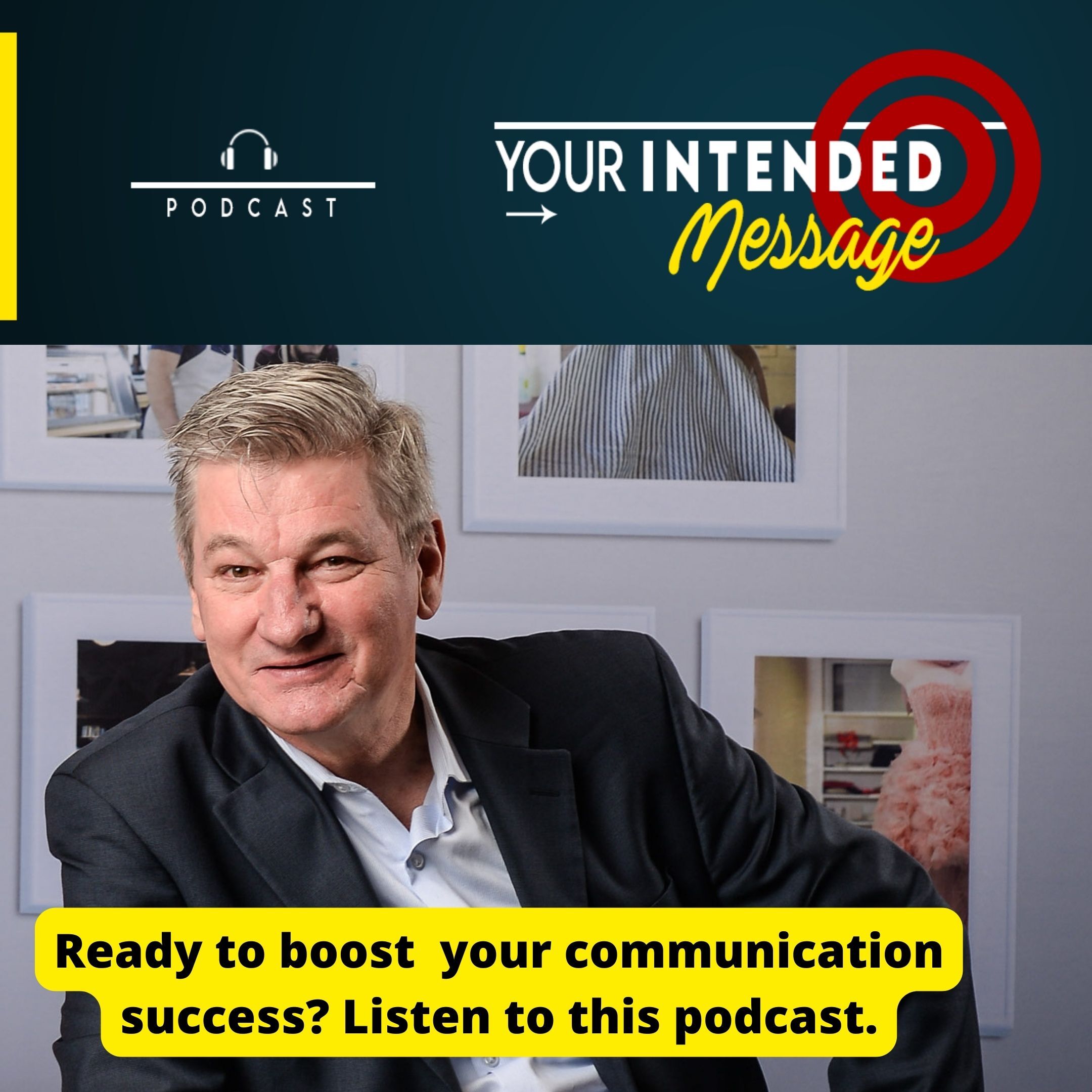
17.1K
Downloads
289
Episodes
The podcast about Effective Communication in Business
Better communication skills will advance your career and business. Are you ready to enhance your understanding and results from better communication? Listen and learn how to deliver Your Intended Message.
Are you willing to cross-examine communication from various perspectives? Would you like to deliver your intended message more effectively?
Listen to Your Intended Message to gain a powerful advantage in your ability to convey your message to your audience, team, clients or marketplace.
Learn from the mistakes and success of communication experts from around the world from different scenarios.
The better communicator has the competitive advantage.
Imagine what that means to you when you improve the success of your next conversation, presentation or message.
Your Host - George Torok
Episodes

Thursday Aug 24, 2023
Permission to Brag about Yourself: Lisa Bragg
Thursday Aug 24, 2023
Thursday Aug 24, 2023
How to promote your success without feeling guilty
You can be proud of your achievements
Episode 169 (Lisa is based in Toronto, Canada)
In this conversation with Lisa Bragg we explore:
- Why your success story can help others succeed
- Change the conversation from failure to talking about success
- Self promotion is self love
- Why did bragging get such a bad rap
- How bragging energizes you and moves you to more success
- How a culture of sharing success stories strengthens your team
- Don't make people feel like hidden gems
- The myths that holds people back
- You don't need to be loud and bombastic
- You can be a team player when you say "my contribution"
- What if people don't like to hear your success story
- Why start a brag book or smile file
About our guest Lisa Bragg:
Lisa is the author of the Bragging Rights: How to Talk about Your Work Using Purposeful Self-Promotion
After a career as a journalist, she has been an entrepreneur for more than 16 years.
You can find the book at all major retailers.
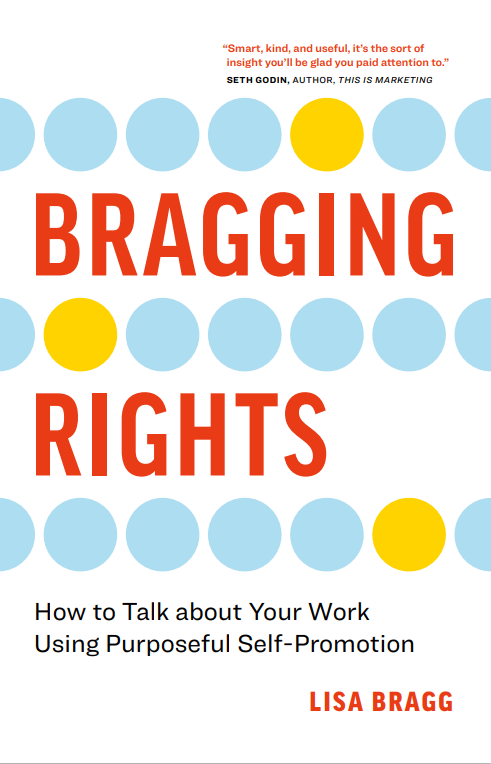
Learn more about Lisa Bragg and her services at
-------------
Excerpts from this conversation with Lisa Bragg:
Delighted to be talking with you today, in particular about your book Bragging Rights. Partly because bragging when I was a kid, it was a bad word,
George, it's such a taboo topic. It really is. And that's why I really want us to start talking about it. Because, you know, we are products of where we've come from. So a lot of us, you know, our parents, it's the factory era.
So they were taught to put your head down, do good work, and eventually someone will notice you. They've passed that on to us. But it's comes from the factory era where we were cogs in a machine. Before that, we wanted to just get a steady paycheck.
But now I'm going to just quickly Fast Forward us. We're now in the information and imagination era. And we all know we compete and collaborate globally. So we need to shift the mindset of what bragging and self promotion is to what it really needs to be.
And I'll get out right off the top for our audience and for everyone. Bragging means to talk about your success with pride. And pride means self love, and I believe we all need more of that self love. But we get it confused with self aggrandizement.
I think it's because self aggrandizement is one of those mouthful words. It's a big word. So and that means that's the puffery that that achiness that we think is bragging, that's the oh, I'm better than you kind of attitude, which is not bragging, bragging is really talking about your success.
------
Talk from a scar, not a wound, when you're telling your stories, it shouldn't be something that you're writing right now and emotionally draining to you.
-----
Read the rest of this entry »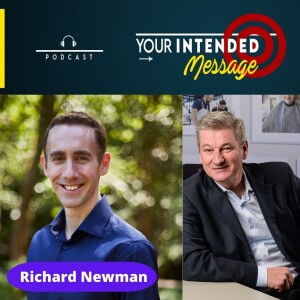
Thursday Aug 17, 2023
Your Body Talks About You: Richard Newman
Thursday Aug 17, 2023
Thursday Aug 17, 2023
The mysteries, myths and magic of non-verbal communication
How to better read and convey body language
Episode 168 (Richard is based near London in the UK)
In this conversation with Richard Newman:
- Why your words alone might not convey emotion
- Sending congruent messages from verbal and non-verbal channels
- The mistakes we make when we only hear the words
- Body language and tone of voice presents the palate
- The three minds that evaluate the message -survival emotional, logical
- Why you need to see and hear beyond the words
- How do we evaluate the truth
- Why the CEO and CFO need to align their body language with the words
- How to read body language in context and from clusters
About our guest Richard Newman:
Richard is the Founder of Body Talk. Over the past 23 years his team have trained over 120,000 business leaders around the world, to improve their communication and impact, including one client who gained over $1 Billion in new business in just one year, using the strategies that Richard teaches.
Richard’s research on non-verbal communication was published in the Journal of Psychology. His study proved that you can increase your leadership ratings by 44% and win 59% more votes in an election by changing a few simple behaviors.
Richard’s new book ‘Lift Your Impact’ explores how you can ‘Transform your mindset, influence and future, to elevate your work, team and life’.
Learn more about Richard and his services at the website
-----
Excerpts from this conversation with Richard Newman:
Do we use body language as an indicator of emotion or an indicator of truth versus untruth?
Yeah, so I think a palette of emotions the great way to explain this and I should say that, I love words, I'm passionate about words. I've written a couple of books. I was very proud to win a speech writing award and going back a few years ago.
And so words can be extraordinarily valuable. But then you got to think about if you are with people, then your body language and your tone of voice is there as the palette that brings this to life and though you don't want to just have a grey Canvas, you need to express it, you need to express what that message really means.
-----
I was terrified to stand up and speak in class, because I just didn't have any confidence around communication. And now I was onstage teaching in front of 1000s of people and enjoying it not just teaching but teaching communication.
And so it's one of those things that you can learn. And if you think about it a little bit like this, you know, it's worthwhile learning lessons where if you approach tennis the same way as as body language, if you think well, you're just a natural or you're not then imagine any of the great tennis players who's doing well at the moment like Novak Djokovic.
If you imagine when he was five years old, his parents said to him, oh, there's a tennis court over there. Just go and be yourself just be natural, you'd be a terrible player, he wouldn't have any idea how to play the game, you wouldn't be a champion.
But instead what happened is he had lessons around forehand backhand serve volley and everything else around the game. And then he built that up in his own way, his own method, his own style, too, as his own personality on the court.
The same goes with body language is that you can start to learn what the principles are. And the important thing around that is that you make them your own.
-------
Read the rest of this entry »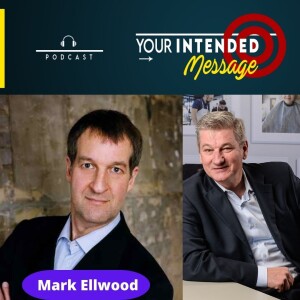
Thursday Aug 10, 2023
Facilitate and Lead Productive Meetings: Mark Ellwood
Thursday Aug 10, 2023
Thursday Aug 10, 2023
Stop wasting time in painful meetings and make them more productive
Meetings can be useful when you prepare for the real purpose
Episode 167 (Mark is based in Toronto, Canada)
In this conversation with Mark Ellwood we explore:
- How to protect ourselves from painful meetings
- Clarifying and communicating the purpose of your meeting
- How might we train for effective meetings
- When the meeting is finished, how will you know if it was a success
- Why everyone is responsible for the meeting out come
- How to facilitate a planning meeting
- How to leverage meeting icebreakers
- How to harvest the diverse ideas while focusing the discussion
- Managing conflicting viewpoints without trying to convince
- Key questions to advance the conversation
- Managing facts versus feelings
About our guest Mark Ellwood:
Mark helps organizations develop their strategic plan. He serves as facilitator, trainer, team builder and time study consultant.
He is an inventor, a poet and a keen puzzle solver.
Learn more about Mark and his services at
-----
Excerpts from this conversation with Mark Ellwood:
Mark, we're going to take a look at what some people hate about business, and how to make it better. And that thing we hate is called meetings. Where do you come across a meeting? Should we have more meetings, Less Meeting shorter meetings, longer meetings? What the heck can we do at these meetings,
We should have effective meetings, you know, you mentioned my sports. In the beginning, I was thinking about my son, who trains incredibly hard to, you know, rowing regatta and rowing races, like five minutes or so. And he really trains hard for that.
How much training we do, or do we do for a meeting that lasts an hour or an hour and a half? Not much at all.
And so the advantage of a meeting is you're bringing all these different people together, we've got different backgrounds and training and input and so on. And that's also the disadvantage, they all bring their own agendas or their own points of view.
And that's why people have trouble with meetings, because all these different personalities. Whereas if you can get them to work, well, then you're on your way.
And we talk about your intended message. And part of that is communicating well during the meeting, so that you're not going astray all over the place, I do have a definition of a meeting the purpose of a meeting, and people go, you know, what are we doing the weekly meeting updates this and that, and so on.
I have studied this for many years, my definition of the purpose is quite simple. It's to convene stakeholders to make decisions that lead to action,
to convene stakeholders who make decisions that lead to action,
When you have that focus on decisions and action that gives a focus to your meeting. Now, there's a couple of exceptions, safety meetings and daily hubs and so forth. But for the most part, that will make our meetings more efficient.
-----
Read the rest of this entry »
Thursday Aug 03, 2023
Intuition, the secret backdoor communication channel: Sunil Godse
Thursday Aug 03, 2023
Thursday Aug 03, 2023
Use Intuitive triggers to persuade and sell more
Why are so many important decisions based on intuition?
Episode 166 (Sunil is based in London, Ontario)
In this conversation with Sunil Godse we explore:
- Why intuition is real and valuable to your decision making
- What does scientific research say about intuition
- How fast does it act and why is it so fast
- How does intuition affect your level of trust with others
- What is the connection with your subconscious
- What signals can you look for
- What are the four types of intuition
- The symptoms -this feels right, my gut, the voice in my head
About our guest Sunil Godse:
Sunil's intuitive branding services helped a struggling $400,000 company earn $3.5 million in just over 2 years.
He is the author of two books, "Gut: What it is. How to trust it. How to use it." and "Fail Fast. Succeed Faster".
Learn about about his intuitive branding services at https://sunilgodse.com/
Buy his books https://sunilgodse.com/books/
-----
Excerpts from this conversation with Sunil Godse:
All because they finally listen to their intuition and their signals. And that's how it works for every single person.
Sunil I'm hearing that what we initially thought intuition was just your body reactions might actually be or according to what you're saying there is actually something happening in in the brain in the amygdala, accessing our subconscious library of information experiences, conversations.
And it happens quickly, so quickly that we can't quote the here's the source of the information. But we know the answer intuitively, we know the answer. And our body is telling us the answer.
Absolutely, absolutely.
There was a reporter that tested - he couldn't believe that this research paper is saying 33 milliseconds and 1014. That's impossible. He put a number of people in the MRI and an MRI machine showed a picture and the brain lit up when the picture came in within 3333 milliseconds.
He said, we're measuring this look at this thing. And by the time they actually pressed a button 10 to 14 seconds, he goes oh my god, like it's actually he's testing it. Right.
And that's one of the things you want to do is research really good research, there's got to be repeatability factor, right. So and I'm really trying to scrape YouTube to find this because this because I want to deal with this stuff. I can't just start putting these stats out if I if I can't believe the research, because it's very important for my reputation.
But that's essentially what happened. And what happens is even if you fail, that failure goes also into the subconscious because now you're going to learn from that.
So as you continually improve your intuition by by succeeding and failing, that's all going to subconscious.
So failure is an amazing result. If you failed before, fantastic, you should celebrate that because there's lessons in what you've learned from those failures that your intuition is picking up on.
Because it's gonna say don't do that again, steal it, just like the person who got shot and killed. I knew the signals the signals were I need to talk to her she was being stalked by someone and my intuitive signal saying meet with her that afternoon.
But somebody else wanted to go for a beer. I said, Can you meet me two days later, and the very next day that shot that stalker? walked up through and put a bullet through her forehead. I'd never, I'm never going to make that mistake again.
Or the business that was struggling at $400,000. Because of trust, nobody trusted the two CEOs. They didn't want to work for them. They were all the employees were looking to leave.
They were six months cash left in their bank account I came in, because they needed somebody to help them. Very first thing I do is I increase the salaries of everyone, they were being grossly underpaid, there's a cash crunch. But I said, the first thing is I need to build trust. And I need to ask them how to fix the business.
When I gained the employees trust, we were able to stabilise and they actually started helping me expand from the three and a half million year in your two. They're the ones that came up to the they spent extra time putting the procedure manuals and they started putting in, you know, extra time to help expand another location, even though was eight hours away, they wanted to do around by themselves.
So that's where they went from struggling 400,000 to 10 million.
-----
Read the rest of this entry »
Thursday Jul 27, 2023
I dare you, Make me Laugh: June Cline
Thursday Jul 27, 2023
Thursday Jul 27, 2023
Let's start by laughing at yourself
Yes you can be funny if you are human
Episode 165 (June is based in Georgia)
In this conversation with June Cline we explore:
- Why use humor in a business presentation
- The risks of using humor and why some speaker avoid it
- How laughter can bring people together and move them towards a goal
- The undiscovered value of our flaws and foibles
- How to find your humor even if you believe you aren't funny
- How to use humor in your presentations
- The four humor styles and why some don't laugh
- You can still be taken seriously
About our guest, June Cline:
A certified, speaking professional showing you how to craft an engagingly powerful speech.
She is an official coach for TEDx St. George, Utah, and known as “The Talking Strategist.”
For 18 years, June has been known as the southern, sassy, and savvy Harley-riding Humorist. She named her motorcycle, "Good Golly Miss Molly".
-----
Learn how June can work with you at
Take the humor quiz to determine your humor style at
Excerpts from this conversation with June Cline:
02:25
I've talked to some executives and they say, Well, you know, we're serious. This is serious business. This is this is trucking, or this is banking, or this is just serious business. We can't be laughing all the time and making jokes. What do you say to them?
02:42
You know what I, I've heard that. And I've gotten major pushback through the many, many years that I've been teaching this. And I just know that's wrong.
And especially if you can come up with what I call an IMO, which executives and everybody hates because it's an idiot moment. But don't we all have them?
Haven't we all experienced locking our keys in the car. And as one client executive found out after we'd call the tow truck and everything his window was down, all they had to do was reach.
So it's just fun stuff like that. And there are some execs and entrepreneurs that will not go there. T
hey just don't want to drop that wall down and allow people in but if you can tell, not a crazy idiot moment, but something that they all happen every day all the time.
So I encourage you to find that IMO idiot moment that will connect you with others.
-----
Read the rest of this entry »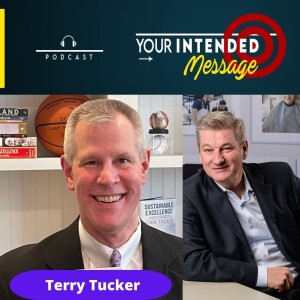
Thursday Jul 20, 2023
What Message are You Telling Yourself? Terry Tucker
Thursday Jul 20, 2023
Thursday Jul 20, 2023
Control your Mind so it Doesn't Control You
Imagine Your Life when you practice smarter self-talk
Episode 164 (Terry is based in Denver, CO)
In this conversation with Terry Tucker we explore:
- The self talk journey when facing horrible circumstances
- How to transition from blame to taking responsibility
- The positive energy from helping others
- How to listen to understand
- Communication lessons from hostage negotiation
- How to say constructive messages to self
- Start a new venture with baby steps
- Where to focus our energy when facing challenging conditions
About our guest, Terry Tucker:
Terry is a former SWAT Team Hostage Negotiator with the Cincinnati Police Department. He has trained with FBI's Hostage Negotiation Team. He's a cancer survivor.
He is the author of the book, Sustainable Excellence, Ten Principles to Leading Your Uncommon and Extraordinary Life.
-----
Excerpts from this conversation with Terry Tucker:
And then she looked at me and she said, well, well, Coach, what do you think my purpose is, I said, I have no idea what your purpose is.
But that's what your life should be about finding the reason you were put on the face of this earth, using your unique gifts and talents and living that reason. So that was one conversation.
And then I had a young man reach out to me from college on social media and asked me what I thought were the most important things, he should learn not to just be successful in his job or in business, but to be successful in life.
And you know, George, I didn't, I didn't want to give them that, you know, get up early, work hard, help others kind of not that those aren't important. Those are incredibly important.
And I wanted to see if I could go deeper with them. So I spent some time taking some notes and eventually had these these 10 thoughts, these 10 ideas, these 10 principles. And so I sent them to him. And then I stepped back and I was like, you know, I got a life story that fits underneath that principle, or I know somebody's life emulates this principle.
So literally, I've been battling cancer for 11 years after I had my leg amputated. And before I started chemotherapy, I had a three or four month period where I was healing. I sat down at the computer every day, and I built stories and there were real stories about real people underneath each of the principles. And that's how sustainable excellence came to be.
-----
Most people think with their fears and their insecurities instead of using their minds.
And I know I've done that in my life, Georgia, and I've been like, Oh, I'd like to do this. Oh, wait a minute, you know, Am I smart enough? Or do I have enough information? Or what will people think about me? If I fail in this endeavor that's thinking with our fears and our insecurities, that's not thinking with our minds.
And I always tell especially when I speak in person to young people always tell him if there's something in your heart, something in your soul that you believe you're supposed to do, but it scares you. Go ahead and do it.
Because at the end of your life, the things you're going to regret are not going to be the things you did, they're going to be those things you didn't do. And by then it's going to be too late to go back and do.
-----
Read the rest of this entry »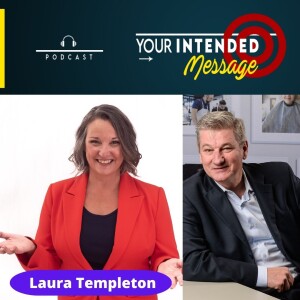
Thursday Jul 13, 2023
All staff can be marketers: Laura Templeton
Thursday Jul 13, 2023
Thursday Jul 13, 2023
Workplace marketing, when everyone is marketing the organization
Nurture the power of the people to spread your message
Episode 163 (Laura is based in Tampa, Florida)
In this conversation with Laura Templeton we explore:
- How to transform all employees into company marketers
- How to tap into the power of workplace referrals
- How to build stronger and stable teams with referrals
- Common values, common goals, common connections
- Talking about your customers and client testimonials
- Spreading the company stories on social media
- How to connect your passion at work and a play
About our guest, Laura Templeton:
Laura educates audiences about client attraction a d brand communication. She is the author of the bestselling book, 30 Second Success: Ditch the pitch and start connecting.
Learn more about the website:
-----
Excerpts from this conversation with Laura Templeton
Well, the first thing is, is if you have a referral program, review it to see how many people are actually using it. If they are great, if they're not ask your employees, if they know about it, when if they do, why they're not using it, your employees are going to tell you why.
Okay, the other pieces is educating your organization, educating our everybody, you know, just give them tips, here's something that we're looking for, let them know, here's your, your ideal client, we need more clients like this.
And then the third piece here testimonials, share the testimonials that your clients are getting in your organization. Hey guys, you You're doing a great job we just heard from you know, this client and this is what they had to say about our organization.
You did this! Do you give your employees the credit when those testimonials come in, because everybody has a part in making those testimonials happen?
Right. So when you start to share your your testimonials, you understand how your referral program is working, and then educating your everybody in your organization on how to use the referral program. It's going to change things for your company and your culture as a whole.
-----
Read the rest of this entry »
Thursday Jul 06, 2023
How to Identify and Influence Company Culture : Michael Grochmal
Thursday Jul 06, 2023
Thursday Jul 06, 2023
What are the telltale signs of your company culture?
How you contribute to the culture
Episode 162 (Michael is based in Oakville, Ontario)
In this conversation with Michael Grochmal we explore:
- What is company culture?
- How is culture set?
- Who influences the culture?
- What messages does culture send to the world about your organization?
- How to shape culture on purpose
- How to notice and identify current culture
- How culture influences relationships with your clients
- What are the various aspects of culture?
- How are emotions and personal energy affected
- How to align activities with the culture
- What is a Culture book and what might it include?
About our guest, Michael Grochmal:
Michael is Director of Culture for CEO Global Network. He's been a member for 14 years.
Before selling the company. he was President of AtlasCare for 12 years.
Learn more about CEO Global Network
-----
Excerpts from this conversation with Michael Grochmal
And that's the other part. I think when it comes to culture, it's about getting agreement. And so anyone thinking facilitator training would say, Do we all agree hands up, we're going to start this meeting on time.
And everyone puts their hands up, look around the room, we've all agreed to this. And so we're now all in a position to hold each other accountable to this idea. It's not about shoving though it down people's throats.
And we live in a world I think today where people want to know the why.
Twenty-five years ago, you could just say do it. And they said, Okay, I'm following orders. I'm a good soldier.
And I would say that people are struggling to some degree with younger generation.
And a lot of times, we don't have a good why. So we say just do it. And the answer is they won't. They actually want to know why. But if you give them the why they will work every bit as part and smarter than previous generations.
This kind of a while you're doing it. And so if you don't know why you can't tell them why and you can't tell them why that's not what you're gonna get. And so I really do believe that everything has to be purposeful as to why you're doing it.
But if it is, the right people will say, Well, that makes sense. That's what we're gonna get dressed up, or that's why we're going to start on time, or that's why we're going to end on time, because they buy into the why, but they don't buy into the why.
I don't know how to put controls in place that would just make people do stuff. And I think we actually have a lot of time and effort is spent trying to but it's really a false thought fallacy that you know, you have to win people's hearts and minds. And the way to do that is to explain why you're doing things.
-----
Read the rest of this entry »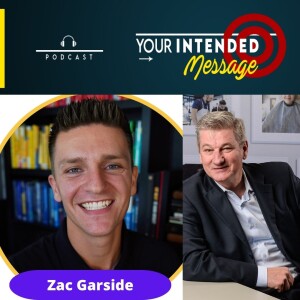
Thursday Jun 29, 2023
Does your customer service truly serve the customer? Zak Garside
Thursday Jun 29, 2023
Thursday Jun 29, 2023
Are you ready to stand out from the competition?
What can you do to be more attractive to your customers?
Episode 161 (Zac is based in Salt Lake City)
In this conversation with Zac Garside we explore:
- Why you should call your competition
- How does your automation help the customer?
- Why compete on price when there are better ways to compete
- Three steps to appear different to your customers
- What is the role of customer service?
- Treat your customer service the way you want them to treat your customers
- How can you use those customer service call-recordings
- How are you attempting to intimidate your customers?
- How to cultivate more constructive feedback for your CS reps
- How to get your people to care
- Why customer service starts with the leader
About our guest, Zac Garside:
Zac became the CEO of Power Selling Pros at age 27 simply by asking the Founder to make him CEO.
Zac speaks to business owners all over the US teaching them how to grow their business with the power of customer service.
You can get your copy of his newsletter, The Storytelling Habit at this website. Tell him you heard him on Your Intended Message to receive a discount code for his courses or coaching programs.
-----
Excerpts from this conversation with Zac Garside
If you call a Delta customer service representative to get help. After the call ends, it will ask you one question. And I love this question.
Because this is helping them I think the question is, on a scale of one to five. If you owned a business, how likely are you to hire the person you just talked to?
Oh, wow, would it be five for yes and one for no? Amazing question. Big and now they're taking that feedback, which is so much better than on a scale of one to 10. How are you how well how good was our service? Right?
How likely are you to hire the person who just helped you? And you take that feedback back to your team? That's motivating because that is a direct reflection of the type of service you provided.
Last time I called delta. I couldn't book a flight online for some reason wasn't working. So I called them this representative was so positive so kind and she found that I had like $700 worth of EA credits in my account that I didn't even know were there.
She finds it, she, she applies it for me. She said something was broken and went and brought somebody else to get involved. I just, I felt like she really cares. He or she, she like actually means what she's saying to me, which is very, very different from most companies.
Because even if you have the right words, and you technically say the right things, if I don't feel like you care, you mean it, it actually can work against you. It's like the slick used car salesman who says the right things, but you just don't feel right about it, you know, versus a more a more clumsy salesperson who kind of tripped over their words, the pitch isn't perfect.
But you feel like they mean it, you feel like they really, really care. And so you're inclined to look at beyond the mistakes and do business with them.
-----
Read the rest of this entry »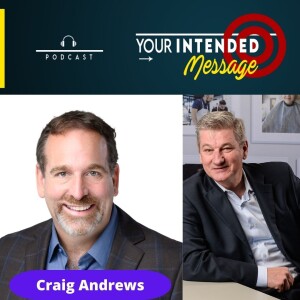
Thursday Jun 22, 2023
How to Score High Ticket Sales: Craig Andrews
Thursday Jun 22, 2023
Thursday Jun 22, 2023
Build irresistible first time offers to accelerate high ticket sales
How to attract the right customer while repelling the wrong customer
Episode 160 (Craig is based in Austin, Texas)
In this conversation with Craig Acosta we explore:
- Why a first time offer helps you address fears and risks of buying
- When to use a first time offer
- How to price your first time offer relative to your main offering
- What's the ideal price range for B to B selling?
- What to address with the first time offer
- How many deliverables to include
- How to structure the offer to leverage cognitive bias
- The danger of a free offer or freebies
- How to justify the temporary low price offer
- Why you must clearly describe your ideal client
- The three necessary components
- Why you need to know the live time value of your customer
About our guest Craig Andrews:
Craig has driven over weight for half a billion dollars in revenue.
He helps business build irresistible first time offers that accelerate high ticket sales. His wife had the chance to pull the plug and did not. That's why he's still here.
Learn more and connect at
https://www.linkedin.com/in/craig-andrews/
https://www.facebook.com/allies4me
Free Offer:
1. Get the guide to build your First Time Offer
2. Take the 23-day self-paced course to develop your First Time Offer
https://allies4me.com/yourintendedmessage
-----
Excerpts from this conversation with Craig Andrews
There are three components that determine that. The first is what you're offering has to be high value. And I've actually had prospects coming through that when they hear us asking the questions we're asking, they realize, oh, these guys aren't some Mickey Mouse firm.
These guys are serious players that know what they're doing. And they actually say partway before we even got to the offer, say, I don't think we're in the same price range. anyone said anything about price, they just took that from they realize what we did, they realize the value of it, and they knew it was not cheap.
So that's the first thing is whatever you're selling has to be high value. And they have to know it's high value.
The second thing is you have to set expectations on what the market value is, if they don't already know that. And so that's why I say if you come back in two or three weeks, this is what this price will be.
So we're telling them, this is the value of what we're doing. So that's also setting expectations that's putting them in the ballpark of what we would normally charge for our work.
And then the third thing that I mentioned a couple minutes ago, is a plausible reason for why it's heavily discounted this time. And the plausible reason can depend upon different things I would not recommend you ever use all because we're not hitting their sales numbers this month, we're offering a special that's please don't do that. No, no, no, that lead makes you look too cheap and desperate.
-----
Read the rest of this entry »